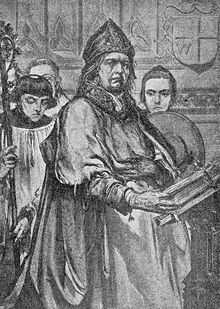Zbigniew Oleśnicki (cardinal)


Zbigniew Oleśnicki or Zbigniew z Oleśnicy (5 December 1389 in Sienno, Masovian Voivodeship – 1 April 1455), known in Latin as Sbigneus, was a high-ranking Roman Catholic clergyman and an influential Polish statesman and diplomat. He served as Bishop of Kraków from 1423 until his death in 1455. He took part in the management of the country's most important affairs, initially as a royal secretary under King Władysław II Jagiełło and later as the effective regent during King Władysław III's minority. In 1449 he became the first native Polish cardinal.
At the age of twenty he was secretary to King Władysław Jagiełło, and fought with him in the battle of Grunwald on 14 July 1410.[1] A favourite with the king, he took part in the management of the country's most important affairs. His influence with the king greatly aided him in opposing the Hussites, who had gained royal favour. On 9 July 1423, he was appointed to the episcopal See of Kraków, and in 1433 he was sent by the king as legate to the council of Basle, where he endeavoured to be on friendly terms with both parties.
On 18 December 1439, he was created cardinal priest with the titular church of St. Prisca, by Pope Eugene IV. As cardinal, his influence in Poland was second only to that of the king, and, during the frequent absence of Casimir IV in Lithuania, he transacted the affairs of the State.
He was recognized as one of the two most important Polish magnates of his time (the other one was magnate Jan Tęczyński.[2]
In 1449, after the death of archbishop of Gniezno and primate of Poland Wincenty Kot, the position was proposed to Oleśnicki, but he refused it. It then passed to his political rival, bishop Władysław Oporowski.[3]
In his conduct of Poland's affairs Oleśnicki entertained far-reaching imperial dreams, which included a complete assimilation of Lithuania into the Polish state and the conquest of Silesia from the Kingdom of Bohemia. In particular, Oleśnicki pursued the idea of a Crusading alliance with Hungary against the Ottoman Turks, with the ultimate aim of extending Poland's boundaries to the Black Sea. This was manifested in promoting Władysław III's taking the Hungarian Crown - to which some Polish magnates were strongly opposed. However, all these aspirations came to naught with King Władysław's death at the Battle of Varna.[citation needed]
Being a man of great learning, he advanced the study of arts and letters in every possible way, and the flourishing condition of the University of Krakow during his episcopacy is due chiefly to his efforts. The well-known historian Jan Długosz was his secretary. To repress the spread of Hussitism he called Giovanni da Capistrano (then in Breslau) and the Minorites to Kraków.
Da Capistrano, whom Oleśnicki invited, was also known for his anti-Jewish zeal, in which he engaged in Poland as in other countries. Oleśnicki's own Anti-Jewish intolerance was manifested in his strongly criticising Casimir IV for reaffirming in 1453 the tolerant measures towards Jews enacted by Casimir III. Under Oleśnicki's influence, the 1454 Statutes of Nieszawa included the provisions that Jews' rights be "restricted when they contradict canon law" and that Polish Jews be compelled to wear distinctive clothing. However, this was never enforced in practice.[citation needed]
| Wikimedia Commons has media related to Zbigniew Oleśnicki. |
References
- ↑ "Zbigniew Olesnicki". Catholic Encyclopedia.
- ↑ (Polish) Tęczyńscy, PWN Encyklopedia
- ↑ (Polish) Bernadeta Kruszyk, Władysław Oporowski, Poczet Arcybiskupów Gnieźnieńskich, Archidiecezja Gnieźnieńska
-
 This article incorporates text from a publication now in the public domain: Herbermann, Charles, ed. (1913). Catholic Encyclopedia. Robert Appleton Company.
This article incorporates text from a publication now in the public domain: Herbermann, Charles, ed. (1913). Catholic Encyclopedia. Robert Appleton Company. - "Oleśnicki Zbigniew". Internetowa encyklopedia PWN (in Polish). Wydawnictwo Naukowe PWN. Retrieved 2008-01-17.
- "Oleśnicki Zbigniew". WIEM Encyklopedia (in Polish). Retrieved 2008-01-17.
| Preceded by Wojciech Jastrzębiec |
Bishop of Kraków 1423–1455 |
Succeeded by Tomasz Strzępiński |
|